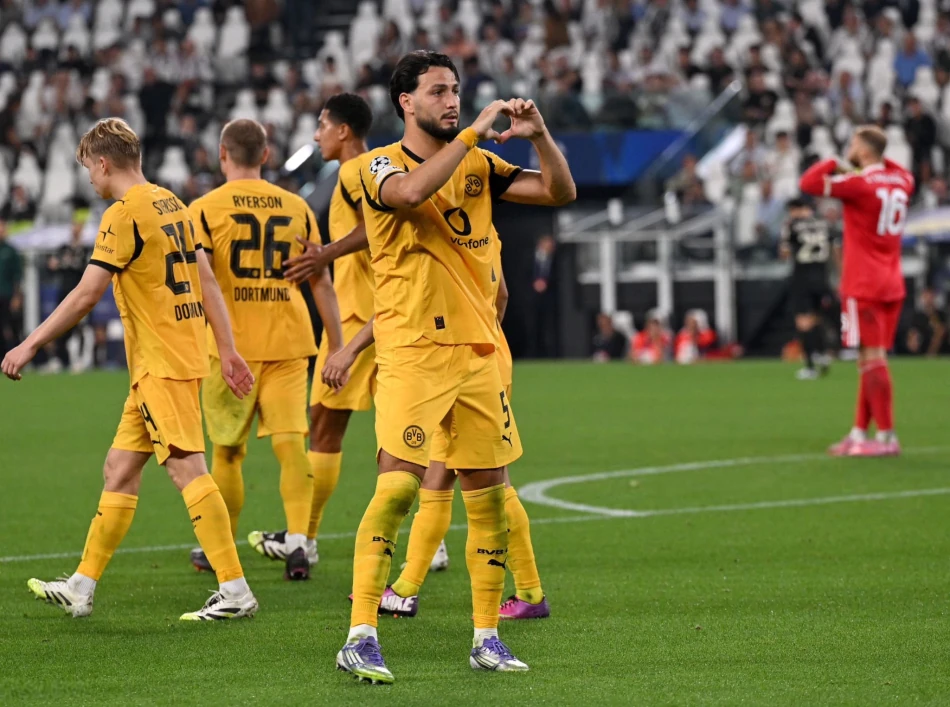
Heated Penalty Controversy Sparks Embarrassing Scenes at Top European Club's Champions League Match (Video)
Penalty Drama Exposes Leadership Crisis at Borussia Dortmund
A public spat between Borussia Dortmund teammates Ramy Bensebaini and Serhou Guirassy over penalty-taking duties during their 4-4 Champions League draw with Juventus has highlighted deeper issues with team discipline and hierarchy at the German club. The embarrassing on-field dispute required direct intervention from coach Niko Kovač and raises questions about Dortmund's ability to compete at the highest level when basic team protocols break down.
The Incident That Shocked European Football
When Dortmund was awarded a crucial penalty with the score at 2-2, what should have been a routine conversion became a public power struggle. Guinean striker Guirassy, who had won the penalty, insisted on taking it himself, while Algerian defender Bensebaini was designated by the coaching staff as the official penalty taker.
Television cameras captured the uncomfortable standoff as both players argued over the ball in front of millions of Champions League viewers. The dispute only ended when coach Kovač intervened decisively from the touchline, ultimately allowing Bensebaini to take and convert the penalty to give Dortmund a 4-2 lead.
Guirassy's Track Record Creates Trust Issues
The reluctance of teammates to allow Guirassy penalty duties stems from his earlier miss this season, which appears to have eroded confidence in his spot-kick abilities. This context makes the public dispute even more damaging, as it suggests internal divisions about player capabilities that should be resolved privately.
A Symptom of Larger Problems at Dortmund
This incident reflects broader challenges that have plagued Dortmund in recent years. Despite consistently developing world-class talent, the club has struggled to maintain the discipline and unity required to compete with Europe's elite. The public nature of this disagreement suggests a breakdown in the chain of command that successful teams simply cannot afford.
Kovač's Authority Under Scrutiny
The Croatian coach's need to intervene so dramatically raises questions about his control over the squad. While he ultimately resolved the situation, the fact that it occurred at all indicates players are not fully aligned with team protocols. This type of indiscipline has historically been rare in German football, where tactical discipline and respect for authority are cultural cornerstones.
Champions League Implications
The timing of this breakdown couldn't be worse for Dortmund's European ambitions. Despite Bensebaini's successful conversion temporarily giving them a two-goal cushion, Juventus capitalized on the disruption to score twice and salvage a draw. The mental impact of such internal conflict often extends beyond single matches, potentially affecting team chemistry for crucial upcoming fixtures.
Comparison to Elite Club Standards
Top-tier clubs like Manchester City, Real Madrid, and Bayern Munich maintain strict hierarchies around set-piece responsibilities precisely to avoid such situations. The contrast between Dortmund's chaotic approach and the clinical professionalism of their competitors highlights why the German club continues to fall short in major competitions despite having comparable individual talent.
The Path Forward
Kovač must now address this public display of indiscipline before it undermines the team's remaining Champions League campaign. Clear designation of penalty takers, combined with private discussions about respecting team decisions, will be essential to preventing future embarrassments.
For Dortmund to fulfill their potential as a Champions League contender, they must demonstrate that individual egos cannot override collective responsibility. The talent is clearly present—Bensebaini's excellent penalty conversion proved that—but channeling it effectively requires the kind of internal discipline that this incident showed is currently lacking.
Most Viewed News

 Sara Khaled
Sara Khaled






